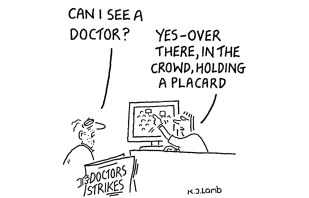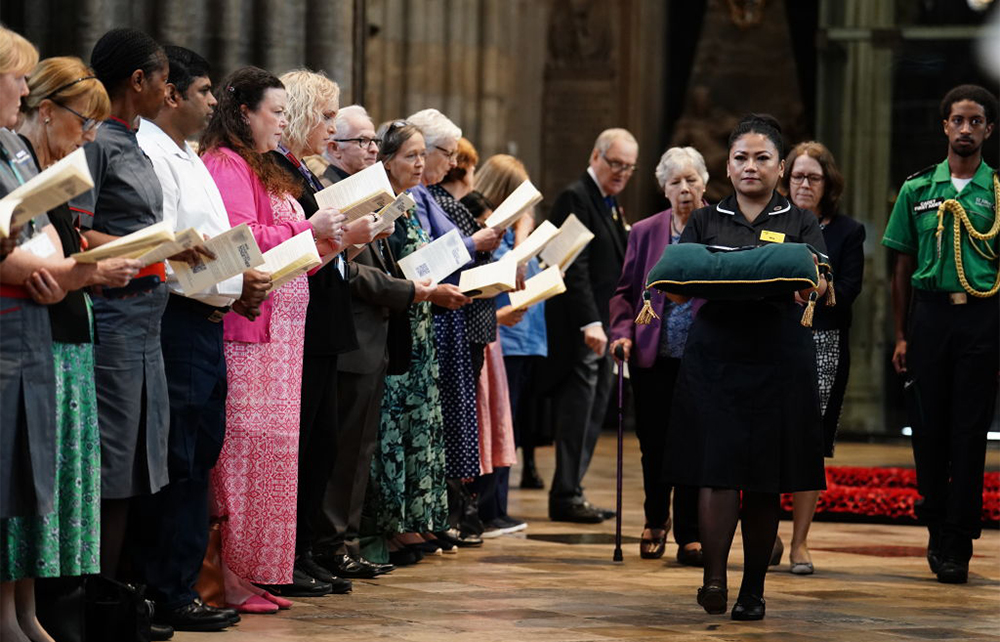It’s a rare occasion that sees politicians put aside their feuds and rivalries to gather together at Westminster Abbey. These moments are limited to weddings, coronations, funerals – and the National Health Service’s birthday. This week the Prime Minister, the opposition leader and a sprinkling of royals joined together to mark the NHS’s 75th anniversary, singing hymns and giving thanks for a system that, according to the latest report, delivers some of the worst outcomes for patients in Europe.
‘We all get that the model is broken and has to change. It’s just that no one is willing to say it out loud’
The George Cross, presented to the NHS by Queen Elizabeth last year, was brought to the High Altar at the start of the service. Rishi Sunak and Keir Starmer gave readings, while Amanda Pritchard briefly traded her title of NHS England’s chief executive for honorary vicar as she delivered an address. The Dean’s sermon spoke of hope: not a hope in God, but rather ‘the hope that is the NHS’. But these public benedictions are increasingly clashing with private despair, as politicians come to terms with the many failures of the NHS model. The public policy area in most need of reform is also the one they know they cannot touch.
‘No one will have enjoyed that,’ says one former health official, familiar with preparing ministers for the big birthday celebrations. ‘The praise for “our NHS” has always looked a little odd. Now it looks delusional.’ With the NHS England waiting list at a staggering 7.4 million, and another round of strikes about to take place, MPs have been hesitant about spouting the usual platitudes about the health service. Still, they went to worship at the Abbey.
Who was the service for? It won’t do anything for the poor souls waiting for referral appointments or suffering after avoidably late cancer diagnoses, nor will it help the doctors and nurses subject to the daily strains of an understaffed, bureaucratised system. According to a report published by the Nuffield Trust last week, staff took an accumulated six million days off last year for ‘anxiety, stress, depression and other psychiatric illnesses [which] increased by 26 per cent between 2019 and 2022’.

Once, underperformance was blamed on underfunding. But the Tories have made so many cash offerings to the health service gods that NHS funding now stands at record levels – ranking sixth in the OECD’s recently published list for healthcare spending across countries. Yet the system’s track record for results remains dire.
The latest offering is £2.4 billion, pledged to increase the NHS workforce over the next 15 years. It may be better targeted than other cash injections in recent memory, but it’s not likely to make meaningful inroads into the current crisis. ‘We didn’t do things when we had the chance,’ laments a Tory MP. ‘Not that we’ve ever dared to ask for a mandate to make changes.’
International comparisons show patient outcomes to be mediocre at best. Even the Commonwealth Fund – the outlier study which tends to give the UK a shot at top billing – dropped the NHS from first to fourth in its ranking of 11 countries in 2021. As always, in its health outcomes category, the NHS was at the bottom of the pack. There’s a growing sense that something has to give.
There are a few brave souls willing to speak up to defy the consensus. This week former health secretary Sajid Javid called for a royal commission to look at other models of healthcare, as he not only calls the current system ‘unsustainable’, but blames it for poor patient outcomes. Meanwhile, the shadow health secretary Wes Streeting continues to make a name for himself by taking on the ‘vested interests’ he spies in the British Medical Association trade union and by condemning the NHS’s deity status, insisting it is ‘a service, not a shrine’.
Some Tories are happy for Streeting and his party to dominate the narrative – for now. ‘We don’t want a bunch of Tories out there making this case,’ says a minister who was pleased to see Tony Blair come out this week to make the case for more private provisions in the health sector. ‘We want to let Labour do it, and then we can row in behind.’ But others see the danger in allowing Labour to dominate the NHS narrative ahead of the next election, especially as the government looks set to miss its target of cutting the NHS waiting list by the end of the year.
Of Sunak’s five priorities, tackling inflation and reducing small boat crossings have received the most attention so far. But there is a gnawing feeling that focus will shift to the NHS, and that could be easily exploited by Labour during an election. ‘If I’m Labour, I’ve got my poster,’ says another MP. ‘A sick person on a sofa and a headline that reads: “One person in every family on the waiting list – that’s the Tory party’s NHS.” Statistically,’ they note, ‘that’s not far off the truth’.
Since the NHS’s last landmark birthday – celebrated five years ago under Theresa May – the Tory tactic has been to funnel more money into the system. But the cash seems to have failed to make its way to staff pay packages or patient care on the front lines. And even if ministers wanted to continue with the splash-the-cash model, they will find it increasingly hard to do so, as the government’s list of non-negotiable spending pledges has been racked up significantly in recent years. There’s the support for Ukraine, new childcare subsidies, and even the simple act of servicing the debt which adds billions of pounds to the Treasury’s bill, thanks to rising interest rates.
Already almost 45 per cent of day-to-day public service spending goes on a model of healthcare that is failing both its staff and its patients. ‘Labour knows the problem as well,’ says a former minister. ‘We all get that the model is broken and has to change. It’s just that no one is willing to say it out loud.’
This won’t be solved with worship services for the NHS. But spare a prayer for the patients and staff who will have to keep enduring this until someone speaks up.







Comments